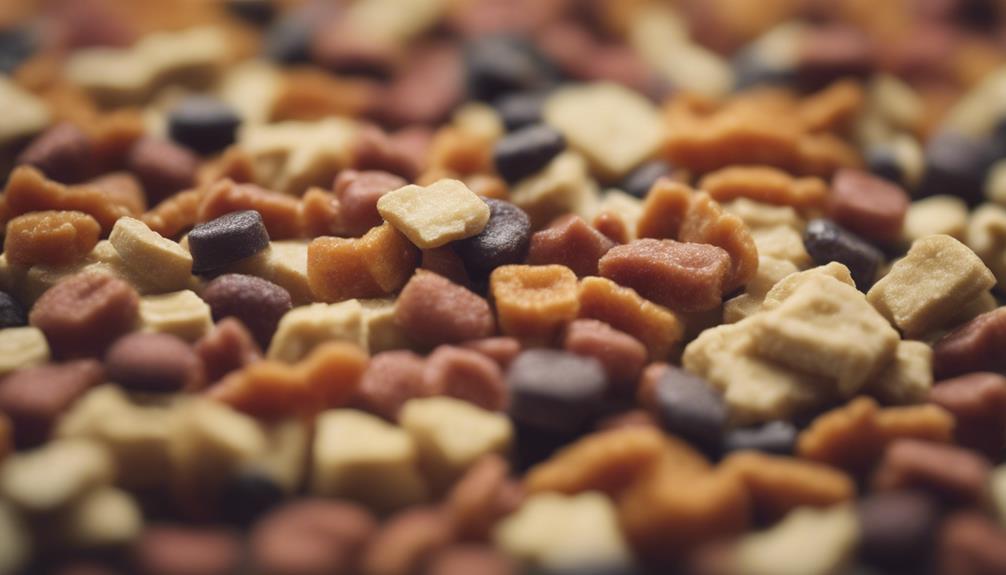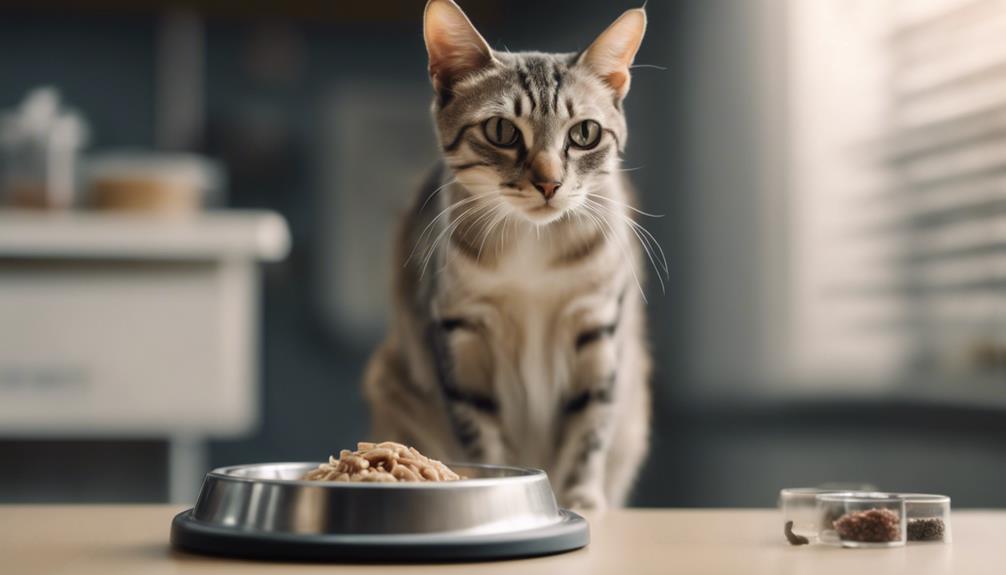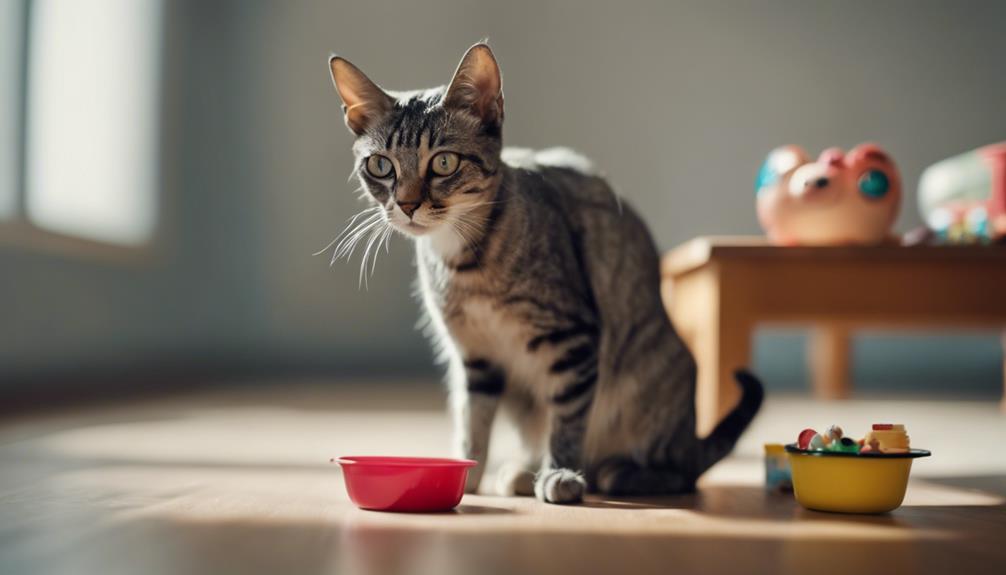Weight loss in cats can serve as a subtle yet crucial indicator of underlying health issues that demand attention. From metabolic disorders to dental problems, the reasons behind a feline shedding pounds can be multifaceted and require a discerning eye.
Understanding the nuances of weight loss patterns in cats is vital for prompt intervention and ensuring their well-being. By exploring the eight reasons why your cat might be losing weight and the appropriate steps to address this concerning issue, we shed light on the importance of proactive veterinary care in safeguarding our feline companions' health.
Key Takeaways
- Weight loss in cats can indicate underlying health issues, requiring immediate vet attention.
- Nutritional needs change with age, causing weight loss despite eating regularly.
- Medical conditions like hyperthyroidism or inflammatory bowel disease can lead to weight loss while eating.
- Regular vet check-ups are crucial to monitor weight changes and ensure timely treatment.
Health Conditions Contributing to Weight Loss
Weight loss in cats can be attributed to various health conditions, including intestinal diseases, dental issues, and underlying medical conditions such as cancer, chronic kidney disease, and hyperthyroidism. When a cat experiences weight loss despite maintaining its appetite, it could signal an underlying health problem.
Nutritional requirements change as cats age, contributing to weight loss. Conditions like hyperthyroidism or inflammatory bowel disease can also lead to weight loss even when the cat continues to eat. Additionally, excessive drinking paired with weight loss may indicate chronic kidney disease or diabetes mellitus.
It is crucial to seek immediate veterinary evaluation if weight loss is observed, as early detection and treatment are essential for your cat's well-being. Regular veterinary check-ups can help monitor weight changes and provide necessary interventions promptly.
Dental Issues and Weight Loss
Dental health plays a significant role in the overall well-being of cats and can contribute to weight loss through various mechanisms. Poor dental health can lead to pain while eating, causing a cat to avoid food and subsequently lose weight. Furthermore, dental issues can result in difficulty chewing and digesting food effectively, leading to reduced nutrient absorption and weight loss.
To address these concerns, it is essential to ensure your cat's dental health is regularly checked and maintained. Here are some key points to consider:
- Regular dental check-ups are crucial for early detection and treatment of dental problems.
- Providing dental-friendly toys or treats can help improve your cat's oral hygiene.
- Brushing your cat's teeth regularly can prevent dental issues and promote better overall health.
- Consulting with a veterinarian for professional dental care and advice is vital for maintaining your cat's dental health.
Nutritional Factors in Weight Loss

Nutritional evaluation is essential in understanding the factors contributing to weight loss in cats. A balanced diet plays a crucial role in maintaining a healthy weight and overall well-being. Here is a table summarizing key nutritional factors that can impact your cat's weight:
| Nutritional Factor | Impact | Recommendation |
|---|---|---|
| Inadequate Caloric Intake | Can lead to weight loss despite eating | Ensure your cat is receiving enough calories through a balanced diet tailored to their needs |
| Poor Nutrient Absorption | May result in weight loss despite a sufficient diet | Consult with your vet to address any absorption issues and consider specialized diets |
| Excessive Treats | Can contribute to weight loss if displacing essential nutrients | Limit treats and focus on providing complete and balanced meals |
Understanding these nutritional factors can help address weight loss issues in your cat effectively.
Digestive Disorders and Weight Loss
A crucial aspect in understanding weight loss in cats involves recognizing the impact of digestive disorders on their overall health and well-being. Digestive issues can significantly affect a cat's ability to maintain a healthy weight. Some key points to consider include:
- Inflammatory Bowel Disease: Can lead to poor nutrient absorption and weight loss.
- Gastrointestinal Cancers: Tumors in the digestive tract can interfere with digestion and cause weight loss.
- Chronic Pancreatitis: Inflammation of the pancreas can disrupt digestion and nutrient absorption.
- Intestinal Parasites: Worms or other parasites can compete for nutrients, causing weight loss despite eating well.
If you notice any signs of digestive disorders in your cat, such as vomiting, diarrhea, or changes in appetite, it is essential to consult a veterinarian promptly for proper diagnosis and treatment.
Metabolic Conditions and Weight Loss

When considering the factors contributing to cat weight loss, it is crucial to examine the role of metabolic conditions in impacting their overall health and body weight. Metabolic conditions such as hyperthyroidism, diabetes mellitus, and chronic kidney disease can lead to weight loss in cats.
These conditions affect the way the body processes nutrients, leading to increased metabolism, insulin issues, or kidney dysfunction, all of which can result in weight loss despite adequate food intake. Monitoring your cat's weight, appetite, and overall well-being is essential in detecting potential metabolic issues early on.
If you notice unexplained weight loss or changes in your cat's behavior, consulting with a veterinarian for a thorough evaluation and appropriate management is paramount to ensuring your cat's health and longevity.
Behavioral Changes Affecting Weight
Behavioral changes can significantly impact a cat's weight and overall health. These changes may include:
- Increased stress levels leading to reduced appetite and weight loss.
- Depression or anxiety affecting eating habits and causing weight fluctuations.
- Changes in routine or environment impacting the cat's eating patterns and weight management.
- Attention-seeking behaviors like overeating or food aggression affecting weight control efforts.
Understanding and addressing these behavioral changes are crucial for maintaining a healthy weight in cats. Creating a calm and stable environment, providing mental stimulation, and ensuring a consistent feeding schedule can help alleviate these issues.
If behavioral changes persist, consulting with a veterinarian or animal behaviorist is recommended for further guidance.
Weight Loss Despite Normal Eating

Despite consistent eating habits, weight loss in cats can still be a concerning indicator of underlying health issues that require prompt attention from a veterinarian. While your cat may be consuming food normally, several factors could contribute to weight loss.
Changes in nutritional requirements as cats age can lead to weight loss despite regular eating. Conditions such as hyperthyroidism or inflammatory bowel disease can also result in weight loss even if your cat maintains its appetite.
Additionally, if your cat is drinking excessively along with losing weight, it could be a sign of chronic kidney disease or diabetes mellitus. It is crucial to schedule an immediate veterinary visit for a thorough medical evaluation and tailored nutrition recommendations to address your cat's weight loss effectively.
Urgent Steps for Cat Weight Loss
In cases of sudden or unexplained weight loss in cats, prompt veterinary intervention is essential to identify underlying health issues and provide appropriate treatment.
- Immediate Vet Visit: Seek medical evaluation if the cat stops eating.
- Early Detection: Weight loss is an early sign of diseases, requiring prompt attention.
- Timely Treatment: Early detection is crucial for timely intervention.
- Regular Vet Check-ups: Monitoring weight changes through regular visits is essential.
Conclusion
In conclusion, cat weight loss can stem from various health conditions, dental issues, nutritional factors, digestive disorders, metabolic conditions, and behavioral changes.
It is crucial to monitor any unexplained weight loss in cats, even if they maintain their appetite.
Seeking prompt veterinary care is essential in identifying the underlying cause and implementing appropriate interventions.
Remember, a stitch in time saves nine when it comes to your feline companion's well-being.




